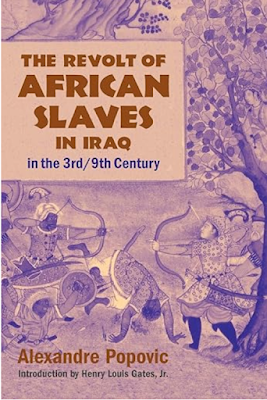Popovic, Alexandre, The Revolt Of African Slaves In Iraq in the 3rd/9th Century, Princeton: Markus Wiener Publishers, 1999
Africans are a largely forgotten community within Iraq. Alexandre Popovic’s The Revolt Of African Slaves In Iraq In The 3rd/9th Century is one of the only books on the subject and it’s about ancient history. It covers a rebellion by black slaves known as the Zanj in southern Iraq and Persian that lasted for over a decade in the 800s A.D. The book has some interesting moments but becomes repetitive detailing battle after battle.
Popovic begins with some background to the Zanj. They were slaves from East Africa and imported through Basra in what is today southern Iraq. They were the primary source of labor in the farms and marshes of the area. All the ancient literature on the Zanj is disparaging calling them dirty, ignorant cannibals. There were two previous uprisings by the community that had no real impact. The authors history sets up the slaves as an exploited and despised group who were ready to rise up once again.
The Revolt Of African Slaves In Iraq then turns to the charismatic leader of the rebellion who was able to fight the Abbasid Empire for over a decade. The revolt began in September 869 in Basra led by Ali Mohammed. Little is known about the man other than that he was a poet, a teacher and a religious man. He played upon Shiism which was the religion of the Abbasids that ruled at the time. He called himself the Mahdi who was supposed to bring justice for Shiites. He’d been trying to build a movement in Bahrain but was frustrated and ended up in Basra. There he found African slaves which he promised freedom and punishment for their slave owners. He was able to gain thousands of followers even though the majority of the Africans didn’t speak Mohammed’s Arabic and needed people to translate for him. Popovic points out that Mohammed’s organizing came at a time when the Abbasids were facing several challenges from armed groups which meant they didn’t focus upon the Zanj for several years allowing the rebellion to spread. Popovic does not buy into the great man theory which dominates much historical writing. He therefore points out that Mohammed had strong leadership skills, but the horrible conditions of the Zanj along with the Abbasids being distracted were more important for the early success of the revolt.
The vast majority of the book is about the fighting. The engagements were quite large with anywhere from a few hundred to several thousand taking part. Because the Abbasids were battling other forces initially the Zanj just fought local villagers and men from Basra city. They were able to constantly defeat them exploiting the marshlands in southern Iraq and Persian. They were able to seize several towns and the city of Basra which they sacked and massacred the inhabitants not once but twice. The rebellion spread northward even threatening Baghdad at one point as well as east into southern Persia. It wasn’t until the Caliph defeated his other opponents that he focused upon the Zanj and eventually defeated them in 883. Several hundred thousand people died showing the breadth and scope of the revolt. It’s pretty amazing that Mohammed and his followers were able to last for fourteen years while the Abbasid Empire was still a world power. That’s why Popovic’s background is important because he points out the Caliph was fighting several other forces before heading south to confront the Zanj.
This section is also the major drawback of the work. The author names all kinds of places, tribes, Abbasid officials and Zanj commanders without much explanation of who they were or where they were located. That means the reader can easily got lost in the text which often times just becomes one name after another. It also gets repetitive because it goes from one battle to the next to the next.
The Revolt Of African Slaves covers an interesting topic especially because it is one of the only books to even mention the black community in Iraq. On the other hand the largest part of the history is about the Zanj fighting here there and everywhere. A casual reader might be best served by just reading the beginning and end and skip the bulk of the writing about battles.
Link to all of Musings On Iraq’s book reviews listed by topic





No comments:
Post a Comment